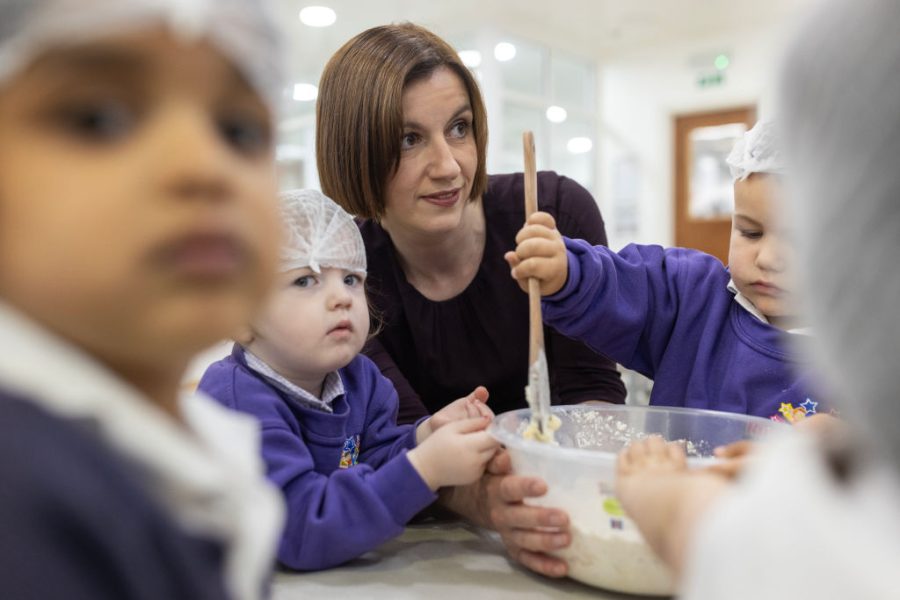Today, every parent of five-year-olds will find out what school their child will be going to in September. The likelihood is that they will get one of their top choices – last year, 93.2 per cent of families received an offer from their first choice of primary school. Reception class is the introduction to ‘proper’ school, and the tiny tots will do more duck-duck-goose than A-B-C. But today’s children arrive incapable of even this light schedule. As we now have heard so often, many arrive in nappies and many will not know how to speak properly or play nicely.
Almost half of teachers say parents have no idea what being school-ready means. And the impact is felt even at secondary school, as the Principal of Chelsea Academy, Mariella Ardron says:
That was what being a parent was all about: taking responsibility for your flesh and blood
We have noticed the impact of younger children who, lacking in school readiness at primary, are then on an almost permanent game of ‘catch up’. The cumulative effect of this is significant… and manifest in the national attendance crisis.
The government has decided enough is enough and has backed the rolling out of a new website to help parents prepare their children for school. It goes today and schools are encouraged to put it up on their own site and send links to every parent and carer.
‘Your child’s journey to school starts at home’ reads the strapline. True: the home learning environment, countless studies show, makes the difference between a child who learns and one who languishes. The website is cheery and bright and accessible, with lots of good links to resources for baffled parents who don’t know how to silence a tantrum or coax toddlers into waiting their turn in a game.
The new website lovingly caters for parents who want to know how to prepare their children for schools. Unfortunately, that’s only half. The other half say that the reason their children are not ready to attend Reception is because they do not view this as the responsibility of parents. That’s a whopping 49 per cent of mothers and fathers who look to schools to equip children with the skills required in the classroom. By ‘skills’ they don’t just mean their 5-year-old knowing their letters and numbers. The 33 per cent of children who are not school-ready are not only functionally illiterate or innumerate; they are not functional at all. They cannot put on their coat, they bite or scratch classmates, they struggle to speak.
We used to learn these basic skills at our mother’s knee. Our parents knew that unless they trained us to play nicely with others, we’d be bullied or ostracised once in Reception; they knew that if we didn’t know how to put on our own coat, our classmates would taunt us in chorus; and god help the child still in nappies when they walked through the school gates: the teasings would traumatise them for life.
Preparing us for life beyond the four walls of our home was a crucial part of parenting. And parenting was what parents did.
No longer. Men and women who have children no longer consider parenting something they signed up to do, when they decided to bring a new being into the world. They are not parents, they are grown-ups with appendages who can be palmed off on others.
This is not, of course, without precedent in the history of our middle and upper classes: Nanny would bring up children in the nursery, teaching them everything from the etiquette of eating at table to the geography of Empire. Parents seldom crossed the threshold of Nanny’s domain – so much so that one 70-something remembers bursting into tears when his elegant and distant mother suddenly appeared by his bedside. ‘Don’t mind him,’ Nanny reassured the baffled mother, ‘He only cries when he meets strangers.’
But Nanny never had to cope with more than three or four charges – today’s teacher needs to control 30. And although back in the day parents might have had no idea how to run a bath for their child, they did know what a well-brought up child needed to master to survive, let alone thrive. They knew what values they wanted their children to embrace and recognised that their duty lay in transmitting these values.
That was what being a parent was all about: taking responsibility for your flesh and blood, ensuring that you equipped them with the wherewithal to flourish. Men and women seem to have lost the appetite for this role – not only are they abstaining from having children, but half of those who do seem to be reluctant to raise them. The long-term impact on the youngest generation should fill us with fear.







Comments